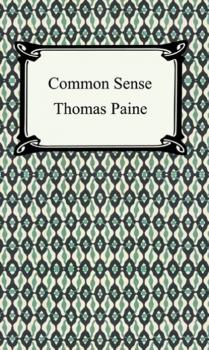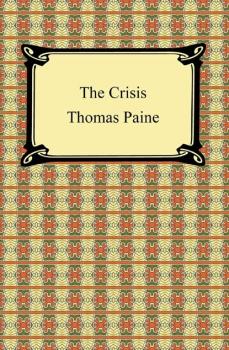Thomas Paine
Список книг автора Thomas PaineThe Age of Reason
"Of all the tyrannies that affect mankind, tyranny in religion is the worst," declared Thomas Paine, adding, «every other species of tyranny is limited to the world we live in; but this attempts to stride beyond the grave, and seeks to pursue us into eternity.» Paine's years of study and reflection on the role of religion in society culminated with his final work, <I>The Age of Reason.</I> This coolly reasoned polemic influenced religious thinking throughout the world at the dawn of the nineteenth century, and its resonance remains undiminished by time. <BR>The selfsame humanist and egalitarian views that made Paine a popular figure of the American Revolution brought him into frequent conflict with political authorities. Parts of <I>The Age of Reason</I> were written in a French jail, where Paine was confined for his opposition to the execution of Louis XVI. An atack on revealed religion from the deist point of view — embodied by Paine's credo, «I believe in one God, and no more» — this work undertakes a hitherto unheard-of approach to Bible study. Its critical and objective examination of Old and New Testatments cites nemerous contradictions as evidence against literal interpretations of the text. Well articulated and eminently readable, <I>The Age of Reason </I>is a classic of free thought. <BR>
Rights of Man
One of the most influential writers and reformers of his age, Thomas Paine successfully publicized the issues of his time in pamphlets that clearly and persuasively argued for political independence and social reform. Rights of Man, his greatest and most widely read work, is considered a classic statement of faith in democracy and egalitarianism.The first part of this document, dedicated to George Washington, appeared in 1791. Defending the early events of the French Revolution, it spoke on behalf of democracy, equality, and a new European order. Part Two, which appeared the following year, is perhaps Paine's finest example of political pamphleteering and an exemplary work that supported social security for workers, public employment for those in need of work, abolition of laws limiting wages, and other social reforms.Written in the language of common speech, Rights of Man was a sensation in the United States, defended by many who agreed with Paine's defense of republican government; but in Britain, it was labeled by Parliament as highly seditious, causing the government to suppress it and prosecute the British-born Paine for treason.Regarded by historian E. P. Thompson as the «foundation-text for the English working-class movement,» this much-read and much-studied book remains an inspiring, rational work that paved the way for the growth and development of radical traditions in American and British society.
Common Sense
Among the most influential authors and reformers of his age, Thomas Paine (1737–1809) was born in England but went on to play an important role in both the American and French Revolutions. In 1774, he emigrated to America where, for a time, he helped to edit the Pennsylvania Magazine. On January 10, 1776, he published his pamphlet Common Sense, a persuasive argument for the colonies' political and economic separation from Britain.Common Sense cites the evils of monarchy, accuses the British government of inflicting economic and social injustices upon the colonies, and points to the absurdity of an island attempting to rule a continent. Credited by George Washington as having changed the minds of many of his countrymen, the document sold over 500,000 copies within a few months.Today, Common Sense remains a landmark document in the struggle for freedom, distinguished not only by Paine's ideas but also by its clear and passionate presentation. Designed to ignite public opinion against autocratic rule, the pamphlet offered a careful balance between imagination and judgment, and appropriate language and expression to fit the subject. It immediately found a receptive audience, heartened Washington's despondent army, and foreshadowed much of the phrasing and substance of the Declaration of Independence.
Common Sense
Written prior to the revolutionary war, «Common Sense» was a widely distributed phamphlet that argued for the complete independence of America from Britain. Its importance in terms of American history cannot by understated. The influence that this publication had on the American sentiment towards fighting the revolutionary war may have been more significant than any other single factor. Read for yourself the arguments that were made then for American independence as the American colonies were on the brink of war.
The Crisis
"The Crisis" is Thomas Paine's series of pamphlets published from 1776 to 1783 during the American Revolution. The first pamphlet begins with the famous words «these are the times that try men's souls» and evokes the mood at the outset of the American Revolution. Many colonists were uncertain of the prospect of war with the British Empire and these pamphlets were designed to bolster morale and resistance among patriots, as well as shame neutrals and loyalists toward the cause. As history would show the conflict with the British for American independence would without doubt be a difficult one but as Paine writes «Tyranny, like hell, is not easily conquered; yet we have this consolation with us, that the harder the conflict, the more glorious the triumph.»
Common Sense (with a Biographical Introduction by John M. Robertson)
First published on January 10, 1776, Thomas Paine’s “Common Sense” was one the most influential and best-selling works from the colonial period. It has been suggested that it may have been the single biggest factor in inspiring the people of the Thirteen Colonies to declare and fight for their independence from Great Britain beginning in the summer of 1776. One of the central political arguments amongst the colonists of the pre-revolutionary period was whether or not they should indeed seek independence and freedom from British rule. The consequences of speaking out against the British Empire were potentially lethal, and as such, the decision of when, where, and how to do so had to be considered with great care. Given its treasonable content and so as not to distract from the central message of the work, Thomas Paine chose to publish the work anonymously. “Common Sense” provided a straightforward argument in clear, simple language, to the American people as to why they should seek independence, and its importance to the shaping of American history cannot be overstated. This edition includes a biographical introduction by John M. Robertson.
Common Sense
Thomas Paine (1737 – 1809) was an Englishman and American political activist. He authored pamphlets which helped motivate the American colonists to declare independence in 1776. Common Sense is his most famous of such pamphlets.
Rights of Man
"Before anything can be reasoned upon to a conclusion, certain facts, principles, or data, to reason from, must be established, admitted, or denied." – Thomas Paine, Rights of Man









